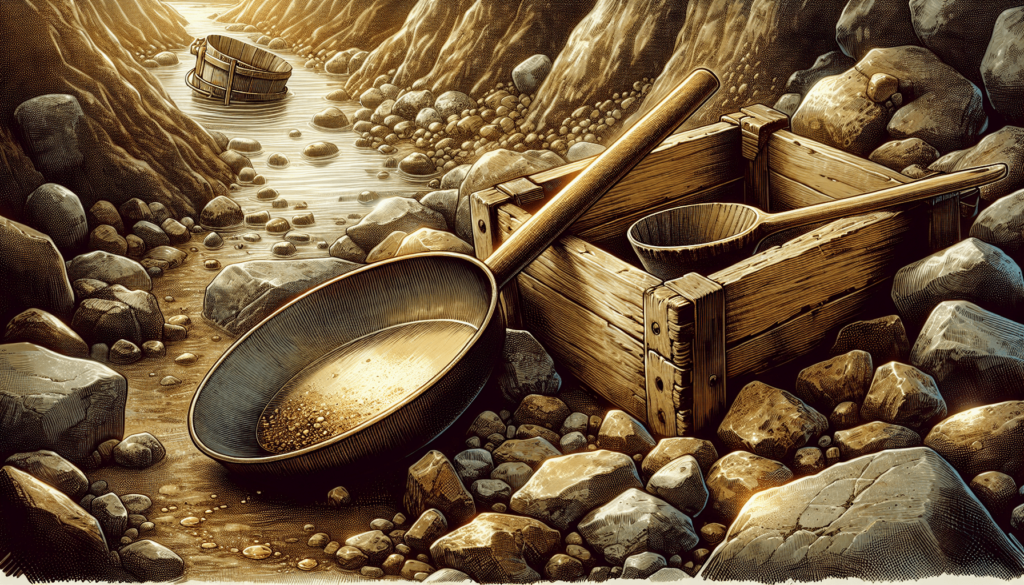Welcome to a helpful guide on strategies for small-scale and artisanal gold mining. In this article, you will learn about the best practices and techniques for maximizing efficiency and minimizing environmental impact in your mining operations. By following these strategies, you can ensure the sustainability and success of your gold mining endeavors. Let’s dive in and explore how you can improve your practices in the small-scale and artisanal gold mining industry.
Have you ever wondered how to effectively mine gold on a small scale?
If you are looking to dive into small-scale and artisanal gold mining, you have come to the right place! In this article, we will explore various strategies and techniques that will help you succeed in this industry. From equipment selection to safety measures, we’ve got you covered. Let’s get started!
The Basics of Small-scale and Artisanal Gold Mining
Before we dive into specific strategies, let’s first understand the basics of small-scale and artisanal gold mining. This type of mining involves individuals or small groups of individuals working independently or in small teams to extract gold from the earth. It is often done with minimal machinery and resources, making it a challenging but rewarding endeavor.
What Makes Small-scale and Artisanal Gold Mining Unique?
What sets small-scale and artisanal gold mining apart from large-scale mining operations is the scale and scope of the activities involved. Small-scale miners typically work on smaller parcels of land, using limited resources and equipment. They often rely on manual labor and simple tools to extract gold from the earth, making the process more labor-intensive.
The Importance of Small-scale and Artisanal Gold Mining
Small-scale and artisanal gold mining play a crucial role in many communities around the world. It provides livelihoods for millions of people, especially in developing countries where formal employment opportunities may be limited. Additionally, this type of mining can help stimulate local economies and support sustainable development in rural areas.
Equipment Selection for Small-scale and Artisanal Gold Mining
Choosing the right equipment is essential for the success of your small-scale gold mining operation. Whether you are prospecting for gold or mining on a small scale, having the right tools and machinery can significantly impact your productivity and efficiency.
Basic Equipment Needed for Small-scale Gold Mining
When starting a small-scale gold mining operation, there are a few basic pieces of equipment that you will need. These include:
- Prospecting tools (e.g., pans, shovels, pickaxes)
- Sluice box or gold pan
- Rock hammer or chisel
- Metal detector (optional)
- Safety gear (e.g., gloves, goggles)
Advanced Equipment for Artisanal Gold Mining
As you gain experience and expand your operations, you may consider investing in more advanced equipment to improve your efficiency. Some advanced equipment options for artisanal gold mining include:
- Trommel or highbanker
- Motorized sluice box
- Crushing and milling equipment
- Gold centrifuges
- Mercury-free gold processing equipment
Remember to carefully assess your needs and budget before investing in equipment for your small-scale gold mining operation. Start with the basics and gradually upgrade as your operation grows.

Safety Measures for Small-scale Gold Mining
Safety should always be a top priority when engaging in small-scale and artisanal gold mining. While the allure of gold may be strong, it is crucial to prioritize the well-being of yourself and your team members. Here are some essential safety measures to keep in mind:
Personal Protective Equipment (PPE)
Wearing the right personal protective equipment (PPE) is key to preventing accidents and injuries in the mining environment. Make sure you and your team members have the following PPE items:
- Hard hats
- Safety boots
- High-visibility vests
- Ear protection
- Respiratory masks
Health and Safety Training
Proper health and safety training can help prevent accidents and ensure that everyone on your team is prepared for potential hazards. Consider providing training on the following topics:
- Hazard recognition
- Emergency procedures
- First aid/CPR
- Safe handling of chemicals (if applicable)
Risk Assessment and Management
Conducting regular risk assessments at your mining site can help identify potential hazards and develop strategies to mitigate risks. Make sure to involve your team members in the risk assessment process and encourage them to report any safety concerns they may have.
Environmental Considerations in Small-scale Gold Mining
In addition to prioritizing safety, it is crucial to consider the environmental impact of your small-scale gold mining operation. Responsible mining practices can help minimize environmental damage and ensure the sustainability of your operation in the long term.
Minimizing Water Pollution
Water pollution is a common concern in gold mining, as chemicals and sediments used in the extraction process can contaminate rivers and water sources. To minimize water pollution, consider implementing the following practices:
- Using non-toxic processing methods
- Proper disposal of mining waste
- Installing sediment control measures
Reclamation and Rehabilitation
After mining activities are completed, it is essential to reclaim and rehabilitate the land to restore it to its natural state. Reclamation practices may include:
- Filling in mining pits
- Restoring vegetation
- Controlling erosion
- Monitoring and maintaining reclaimed areas
Engaging with Local Communities
Engaging with local communities and stakeholders can help build positive relationships and ensure the social license to operate. Consider implementing community development projects, such as providing job opportunities or supporting local infrastructure, to enhance community well-being and support sustainable development.

Effective Gold Processing Techniques for Small-scale Mining
Processing gold ore efficiently is essential for maximizing your profits and minimizing waste in a small-scale mining operation. There are several processing techniques that you can consider implementing to improve the recovery of gold from your ore.
Gravity Concentration
Gravity concentration is a common method used in small-scale gold mining to separate gold particles from the surrounding rock and mineral ore. This technique relies on the differences in density between gold and other minerals, allowing for efficient separation and recovery of gold particles.
Mercury Amalgamation
Mercury amalgamation is a traditional method of gold extraction that involves mixing mercury with gold ore to form an amalgam. While effective at capturing gold, mercury poses serious environmental and health risks and should be used with caution. Consider using mercury-free alternatives, such as cyanidation or gravity concentration, to minimize environmental impact.
Cyanidation
Cyanidation is a widely used method for extracting gold from ore by leaching it with cyanide solution. While effective at recovering gold, cyanidation can have significant environmental and health implications if not managed properly. Ensure that you have the necessary permits and follow best practices to minimize cyanide exposure and environmental impact.
Flotation
Flotation is a mineral processing technique commonly used in gold mining to separate valuable minerals from waste rock. By creating a froth layer on the surface of a slurry and collecting the valuable minerals in the froth, flotation allows for effective concentration and extraction of gold particles.
Heap Leaching
Heap leaching is a cost-effective method for processing low-grade gold ore by stacking ore on a pad and applying a leaching solution to extract gold. This technique is suitable for small-scale gold mining operations with low initial capital investment and can be scaled up as needed.
Compliance with Legal Regulations in Small-scale Gold Mining
Ensuring compliance with legal regulations is essential for the success and sustainability of your small-scale gold mining operation. Failure to comply with laws and regulations can result in fines, penalties, and even the shutdown of your operation. Here are some key steps to help you stay compliant:
Obtain the Necessary Permits and Licenses
Before starting your small-scale gold mining operation, make sure to obtain the necessary permits and licenses from the relevant authorities. This may include mining permits, environmental permits, and occupational health and safety permits. Ensure that you have a clear understanding of the legal requirements in your area and comply with them accordingly.
Implement Best Practices for Environmental Protection
Adhering to best practices for environmental protection is crucial for maintaining compliance with environmental regulations. Make sure to monitor and report any environmental impacts of your mining activities and take proactive measures to minimize pollution and conserve natural resources.
Comply with Health and Safety Standards
Ensuring the health and safety of yourself and your team members is not only a moral obligation but also a legal requirement. Comply with occupational health and safety standards, provide adequate training and personal protective equipment, and conduct regular safety inspections to prevent accidents and injuries.
Marketing and Selling Your Small-scale Gold
Once you have successfully extracted and processed gold from your small-scale mining operation, the next step is to market and sell your product. Effective marketing strategies can help you reach potential buyers and secure fair prices for your gold. Here are some tips for marketing and selling your small-scale gold:
Establish Relationships with Buyers
Building relationships with buyers and establishing a reputation for quality and reliability can help you secure regular sales opportunities. Consider networking with local jewelers, gold dealers, and refiners to explore potential partnerships and sales agreements.
Seek Certification
Obtaining certification for your gold as ethically and sustainably sourced can add value to your product and attract environmentally conscious buyers. Consider seeking certification from reputable organizations such as the Responsible Jewelry Council (RJC) or Fairtrade Gold to differentiate your gold in the market.
Utilize Online Platforms
Online platforms can be a convenient and effective way to market and sell your gold to a wider audience. Consider setting up a website or online store to showcase your products, reach potential buyers globally, and facilitate secure transactions.
Participate in Trade Shows and Exhibitions
Participating in trade shows and exhibitions can provide valuable exposure for your small-scale gold mining operation and help you connect with potential buyers and investors. Look for industry-specific events and conferences where you can showcase your products and network with industry professionals.
Conclusion
Small-scale and artisanal gold mining can be a challenging yet rewarding endeavor for individuals or small groups looking to extract gold from the earth. By following the strategies and techniques outlined in this article, you can increase your chances of success and create a sustainable and profitable mining operation. Remember to prioritize safety, environmental responsibility, and compliance with legal regulations in all aspects of your mining activities. Good luck on your gold mining journey!
Remember that success in small-scale and artisanal gold mining takes time, dedication, and careful planning. By implementing the strategies and techniques discussed in this article, you can increase your chances of success and build a sustainable and profitable mining operation. Happy mining!

